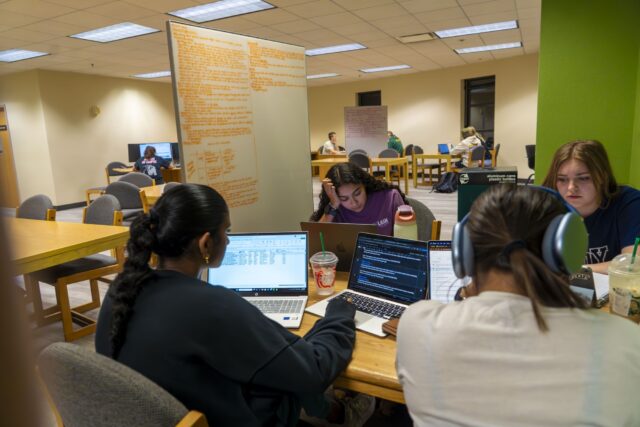By Arden Berry | Staff Writer
Christmas trees and garlands are popping up across campus, signaling the approaching end of the semester. However, between the many weeks past and the weeks remaining, filled with projects, homework and exams, students experience a sense of burnout during the final stretch.
According to the National Institutes of Health website, “burnout” is a state of exhaustion, often caused by stress from an overwhelming amount of work.
“The term ‘burnout’ was coined in the 1970s by the American psychologist Herbert Freudenberger,” the website reads. “He used it to describe the consequences of severe stress and high ideals in caregiving professions. Doctors and nurses, for example, who sacrifice themselves for others, would often end up being ‘burned out’ — exhausted, listless and overwhelmed.”
Students can experience burnout as well. A study by Liang Zhe Chong, Lee Kien Foo and Sook-Ling Chua examined 38 studies published from 2019-2024 that investigated student burnout. The study noted that burnout had a positive association with maladaptive coping strategies such as social withdrawal. Meanwhile, students with adaptive coping strategies, including social support, reported lower levels of emotional exhaustion and higher levels of academic efficacy.
Dallas sophomore Alejandro Luna, a pre-medical student, said he has witnessed burnout among his peers.
“Burnout, I would say, is seen in terms of doing less activities, maybe not going to class or changes in someone’s routine,” Luna said. “And so I think any change in that is a good indicator. But then I also do believe it can be kind of silent at the same time. Maybe sometimes they’re just going through the motions.”
Fort Worth senior Rylee Robertson said being overwhelmed with schoolwork has made it harder for her to find time and energy to hang out with friends, further exacerbating her burnout.
“I’ve always imagined senior year kind of like high school, where it’s a lot more free and a lot more time to spend in community, but to be honest, where I am right now is I’ve realized I’m more isolated because of doing a lot of projects or thesis work and a lot more essays than expected for senior year,” Robertson said.
She said her friends being “intentional” with checking on her has helped her through the burnout.
“Make sure you lean on people because I’ve seen what it does to be isolated and it’s very important that in those times where you feel like you’re not 100% yourself, it’s OK to be around your friends because they’re going to love you anyway,” Robertson said.
Copperas Cove sophomore Sa’Mya Thomas, who is pre-psychology and pre-med, said she goes on “mental health walks” with her friends around campus to remedy her burnout.
“I feel like having that sense of community and a really good core group of friends really helps to counteract burnout,” Thomas said. “They’re going through it too, so you can just hang out with them.”
Thomas also said good time management and a balance of required science and humanities courses have saved her from some burnout.
“I know some people, they complain a lot about having to take the histories and the religion classes, but I think those are really good to have to balance out the sciences, so you’re not doing all science one semester and you don’t get fed up or bite off more than you can chew,” Thomas said.
Despite the burnout, winter break will arrive in a little over a month, and the promise of reprieve brought by holiday decorations will be fulfilled. Until then and even beyond, though, Luna said he has staved off burnout by focusing on his end goal.
“Knowing that I’m doing something for a reason is what doesn’t make me get burned out,” Luna said.



